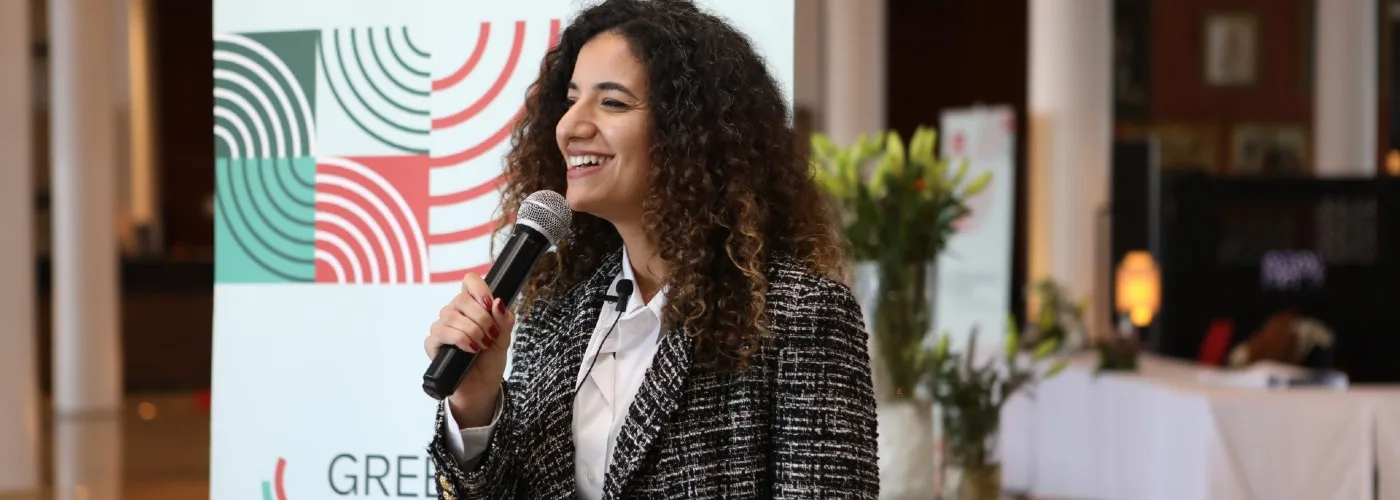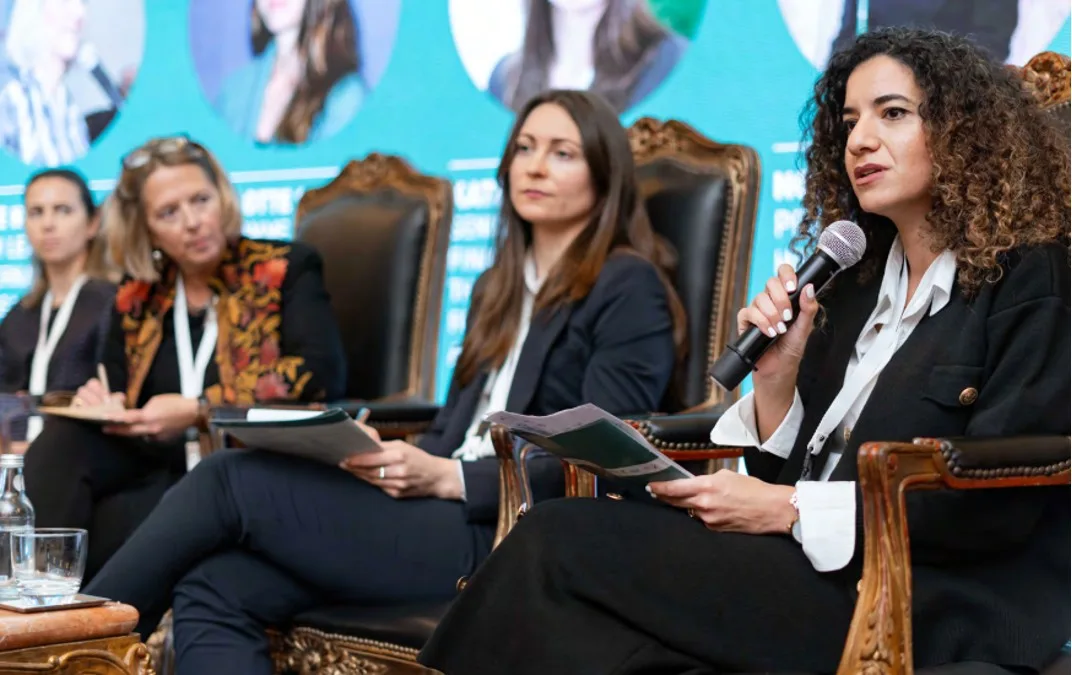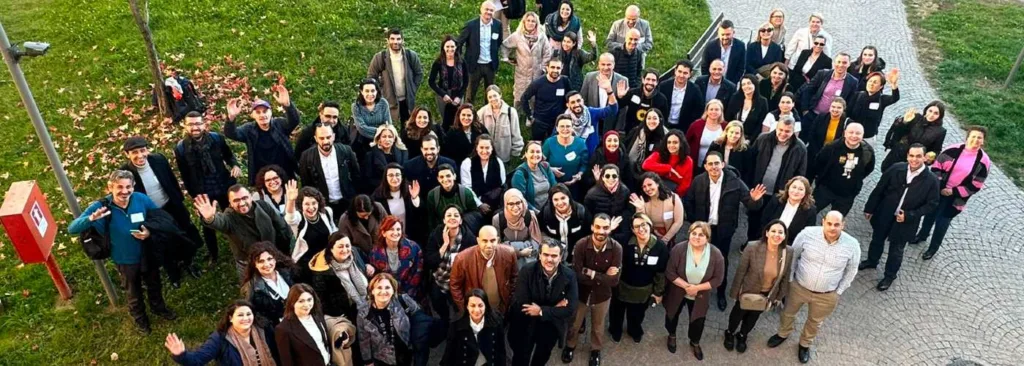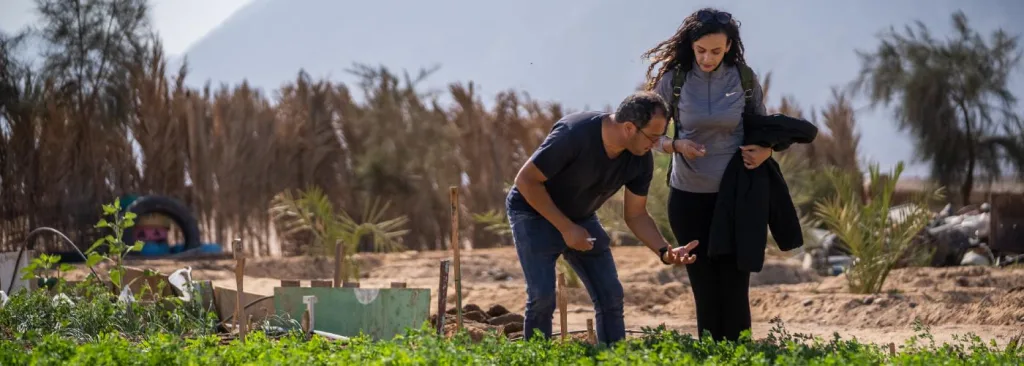We’re in middle of organizing the Green Growth Summit. A regional event in Tunis and Cairo that will build partnerships for climate change mitigation and open green economic pathways in North Africa. Imen Boudali sat down with Noha El Sebaie, Program Manager for Hivos’ Green Entrepreneurship and Employability programs in the MENA region.
What does Hivos aim to achieve with its green entrepreneurship and employability programs in the region?
The MENA region is disproportionately impacted by climate change, particularly in terms of droughts. It’s one of the hottest regions globally, and recent years have shown the significant damage caused by climate change. Moreover, we’ve identified a strong potential in the MENA region’s green sector and aim to support its transition. We also want to assist extremely vulnerable groups, particularly women, who are largely involved in the agriculture sector in the region but often struggle to benefit from it. Therefore, our focus is on creating decent jobs as a means to facilitate the region’s equitable green transition.
What are some of the key initiatives that Hivos has undertaken in the field of green entrepreneurship and employability?
I’m proud of that fact that Hivos has been quite visionary when it comes to green entrepreneurship and employability. Our work in the MENA region in this area began around 2018. That is when we started recognizing the potential in the green sector. This recognition came through our longstanding flagship program, GreenWorks, part of the larger LEAD program consortium funded by the Dutch Ministry of Foreign Affairs. GreenWorks is a 9-million-euro program aimed at creating and improving sustainable jobs for 9,000 youth in the region, and it has been highly successful. It has operated in Egypt, Tunisia, and Algeria and we have achieved significant milestones. We’ve supported over 340 small and growing businesses, trained more than 10,000 young people, and sustained and created over 7,000 jobs. Additionally, we’ve helped our partners and businesses leverage over 10 million euros, a significant amount considering the challenges the region has faced since 2019, including the impacts of Covid-19.
Building on this success and expertise, we have refined our strategies and developed new programs. One such program is the Challenge Fund for a Just Transition (CFJT). This program focuses on small and growing businesses in Egypt, Tunisia, Algeria, and Morocco. Rather than dealing with these businesses as a single entity, we identify them as “cluster champions,” providing both technical and financial support. Our fundamental belief is that supporting green businesses is not just beneficial for the environment; it is also good for business, being both profitable and impactful environmentally. Currently, we are supporting 25 companies, and we are aiming to create and improve another 10,000 jobs for youth in the green sector.
Our third program Impact Together! (I2G), funded by Impact Europe, an EU-funded initiative, serves as an addition to the CFJT, acting as a leverage program. We are a regional partner in this initiative, which operates in six countries, including Lebanon and Palestine. This program assists social support organizations in the region through the development and creation of impact investment funds.
How do these programs address the challenges and opportunities in promoting sustainable entrepreneurship?
The core concept of our portfolio is centered around creating an ecosystem. We understand that job creation and the green transition are gradual processes that do not occur overnight. Within GreenWorks, this involved developing capacities, starting with investor networks, angel investors, VC funds, and others who are either interested in or already operating in the green sector. We also collaborated with business support organizations across different countries to enhance their capabilities. Through these efforts, we facilitated the establishment of at least six green incubators and provided support to small and growing businesses. Additionally, we engaged with job matching hubs and implemented a job creation component. These initiatives are continuing through the CFJT program, where we are refining our strategy based on our learnings.
As GreenWorks is concluding in June 2024, we wanted to share the knowledge that we gained over the years. We’ve also observed the growth of the ecosystem, with more stakeholders expressing interest in the green economy but lacking clarity on how to engage. In response, we have launched the Green Growth Summit. We want to bring key stakeholders together, fostering collaboration and generating tangible outcomes. We are inviting impact investors, green sector investors, policy makers, development financial institutions, donors with green strategies, small and growing businesses, and business support organizations to participate. The summit consists of two consecutive events, the first was organized in Tunisia on April 30. The second will take place in Egypt on May 14. We are fortunate to have the support of various donors for this program, including Expertise France in Tunisia, Business Egypt in Egypt, Pathfinder, and several others. This initiative will allow us to continue the learning process and further enhance our impact in the region.
For the Green Growth Summit, what role do you envision playing in advancing the agenda of green growth and sustainability in the region?
This ties back to the evolving objectives of the Green Growth Summit. Our aim is to bring all stakeholders together and coordinate their diverse efforts. We see ourselves as pioneers in fostering this coordination across various levels – from investors to DFIs, donors, and even entities needing to raise awareness about green impact investments. Our focus extends to continually sharing the insights and findings we’ve gathered, as well as exploring potential linkages and networking opportunities. Specifically, we’re committed to leading risk investments in green businesses to facilitate their growth. As these businesses expand, they’re able to create new opportunities.
What are the key themes that you will be focusing on at the Green Growth Summit?
This year, we have five primary tracks planned. First, we have a track focusing on green exports, aiming to capitalize on the region’s competitive advantage to drive green exports and showcase compelling case studies. Another track is centered on de-risking green investments, exploring the best models and opportunities for investors and donors to collaborate in reducing investment risks in the green sector. Additionally, we are developing a track on green jobs, delving into the definition of a green job to see what necessary skills and sectors of focus are in each country. We are also working on a track dedicated to cluster champions, which aims to promote green clusters and value chains for the development of green solutions. Finally, there is a track on green impact investments, tailored for donors and investors interested in the impact investing field. This track will cover blended forms of finance and fund management, providing insights for those keen on making impactful investments in the green sector.
How do you plan to collaborate with other stakeholders?
We actively seek partnerships and do not operate in isolation. For example, under GreenWorks, we established the Green Alliance, a network comprising over 15 members including angel investors, small and growing businesses, donors, and job matching institutions. We aim to further develop donor coordination groups emanating from the summit. Plans are underway to create one in Tunisia and another in Egypt, with announcements to follow shortly after the summit. Our vision is for the summit to become an annual event. It is not merely a gathering, but a year-long endeavor including pre-summit and post-summit activities. Crucially, our focus remains on continuous networking and linking of stakeholders. Hivos does not always have to lead a specific initiative; during our events, we are pleased to facilitate connections and bring stakeholders to the table for collaboration.
Can you share any expectations for the outcomes of the Green Growth Summit?
Besides the two donor coordination groups in Egypt and Tunisia I mentioned, we have identified numerous potential investment opportunities for our SGBs (small and growing businesses) and other participants. There will be working sessions dedicated to team formation, where these opportunities will be explored. We anticipate a diverse range of opportunities to be shared and learned from during these sessions.
We are also actively capturing insights from the various tracks of the summit. These learnings will be shared and disseminated among our partners. Moreover, we aim to align with policymakers attending the summit, facilitating discussions with the DFIs to align their strategies effectively. Our goal is to foster a holistic approach to sustainable growth and innovation in the green sector throughout the region.





